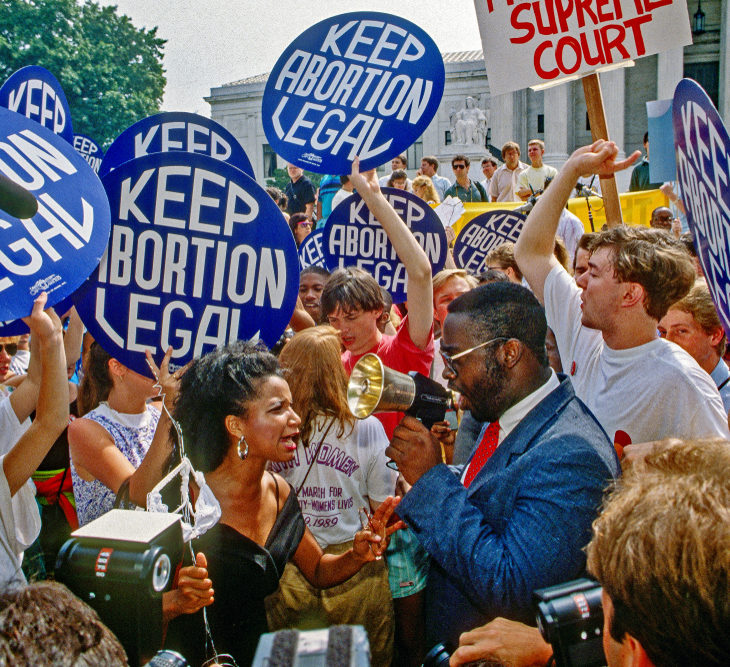How Can I Build Bridges in a Post-Roe v. Wade America?
June 24, 2022

I was sitting in my living room with my mother when news of the original leak of Dobbs decision came in. “Women will die,” my mother said simply when I read the headline aloud. As the news that the Supreme Court did indeed overturn the Constitutional right to abortion came in, her words resounded in my mind.
Caitlyn Flanagan’s piece “The Dishonesty of the Abortion Debate” vividly describes the ways that women would use the cleaning product Lysol to manage unwanted pregnancies. I remember when I first read the piece, my breath became ragged, understanding how the cleaning product affected women’s bodies. I absorbed the sheer desperation these women – so many women – feel, to be willing to subject themselves to such a brutal and risky experience.
Close your eyes, for a moment. Imagine these women’s pain and fear – and the pain and fear of surviving husbands and children for the many women who died.
My rage is not far from the surface, these days. I feel it simmering when I hear about a potential federal abortion ban, the possibility of criminalizing birth control, or prosecuting women and girls who receive abortions. My rage comes near to boiling over when I consider the fact that my three daughters will grow up with less autonomy over their bodies than I have now.
Bodily autonomy is a core religious and moral value for me. I believe that people should have control over their own bodies. That core belief sits alongside other core religious beliefs, including that curiosity and listening are essential ways we respect the dignity of fellow human beings. These core beliefs, especially in light of the Dobbs decision, are in profound tension with one another. That tension is vivid and emotional for me. Nevertheless, holding that tension is essential for my own individual, and I believe our collective, pathway forward in this new post-Roe world.
And so I take a deep breath and settle my rage. I lean into those other core values and activate my bridgebuilding lens.
What does it mean to have a bridgebuilding lens? Amanda Ripley’s High Conflict chronicles the characteristics of institutions in a state of toxic conflict – where individuals are so enmeshed in a particular conflict that they can see no pathway forward. Ripley describes the “power of the binary,” the type of black-and-white, us v. them thinking that often characterizes high conflict. According to Ripley, breaking down our binaries is an essential step to break free from toxic conflict and emerge into “good conflict,” productive disagreement which can lead to problem-solving and dispute resolution.
The binary is everywhere in the abortion debate – pro-life vs. pro-choice, abortion abolition vs. reproductive freedom. We believe in that binary even those most Americans hold more nuanced views about abortion. Both sides will claim that American public opinion is with them – both sides are diminishing the nuance of what opinion polling actually tells us.
My version of breaking down the binary starts with that fact – accepting the ambiguity that the beliefs of my fellow Americans are complicated. I can even understand that ambiguity on a personal level because I connect deeply with the value of protecting unborn life. I’ve carried three lives inside my body, and they were holy and precious to me from the moment I knew of their spark.
My version of breaking down the binary continues with listening carefully to individuals with whom I disagree. I’m not seeking out voices who are arguing in bad faith – but I am looking for individuals that I admire for other reasons and genuinely seeking to understand their perspectives. I want to listen and seek to understand perspectives that differ from my own, because working with those perspectives is now essential.
My version of breaking down the binary also means embracing Nelson Mandela’s idea that we must live with our opponents after we defeat them. In his words, “There is nobody more dangerous than one who has been humiliated, even when you humiliate him rightly.” Mandela was affirming the principle that we can – we must – advance our own commitments without dishonoring people who feel differently. After all, even in the contexts where our own perspectives prevail, it isn’t as though dissenting voices suddenly go away – and how do we all live together and thrive in the midst of that deep disagreement? As one despairing the loss of Roe, I feel this hope for respect from the opposing side acutely. We must remember that treating individuals who feel as though they are something with dignity and respect is a sacred task, indeed.
With these three key ideas – accepting ambiguity, listening with curiosity, embracing the dignity of those with whom you disagree – I aim to hold my core values in tension. I don’t need to sacrifice my deeply held beliefs to also believe that these principles of bridgebuilding are a vital tool to lead us to a more productive place. Indeed, Ripley’s research shows that better, more lasting solutions to intractable problems come when individuals engage with those with whom they disagree with empathy and care for their perspectives, even, especially, when you disagree. Finding those solutions are more essential today for those of us who lament the loss of Roe.
My rage motivates me to continue the fight for bodily autonomy. My curiosity compels me to listen carefully, with attention to nuance, and treat others with dignity. I choose to carry them both in the days and weeks to come.
Share
Related Articles
American Civic Life
Is This a Time for Bridgebuilding? 5 Leaders in Conversation
American Civic Life
American Civic Life
We Commemorate, We Commit: Out of Catastrophe, a Conversation on Connection and Repair



